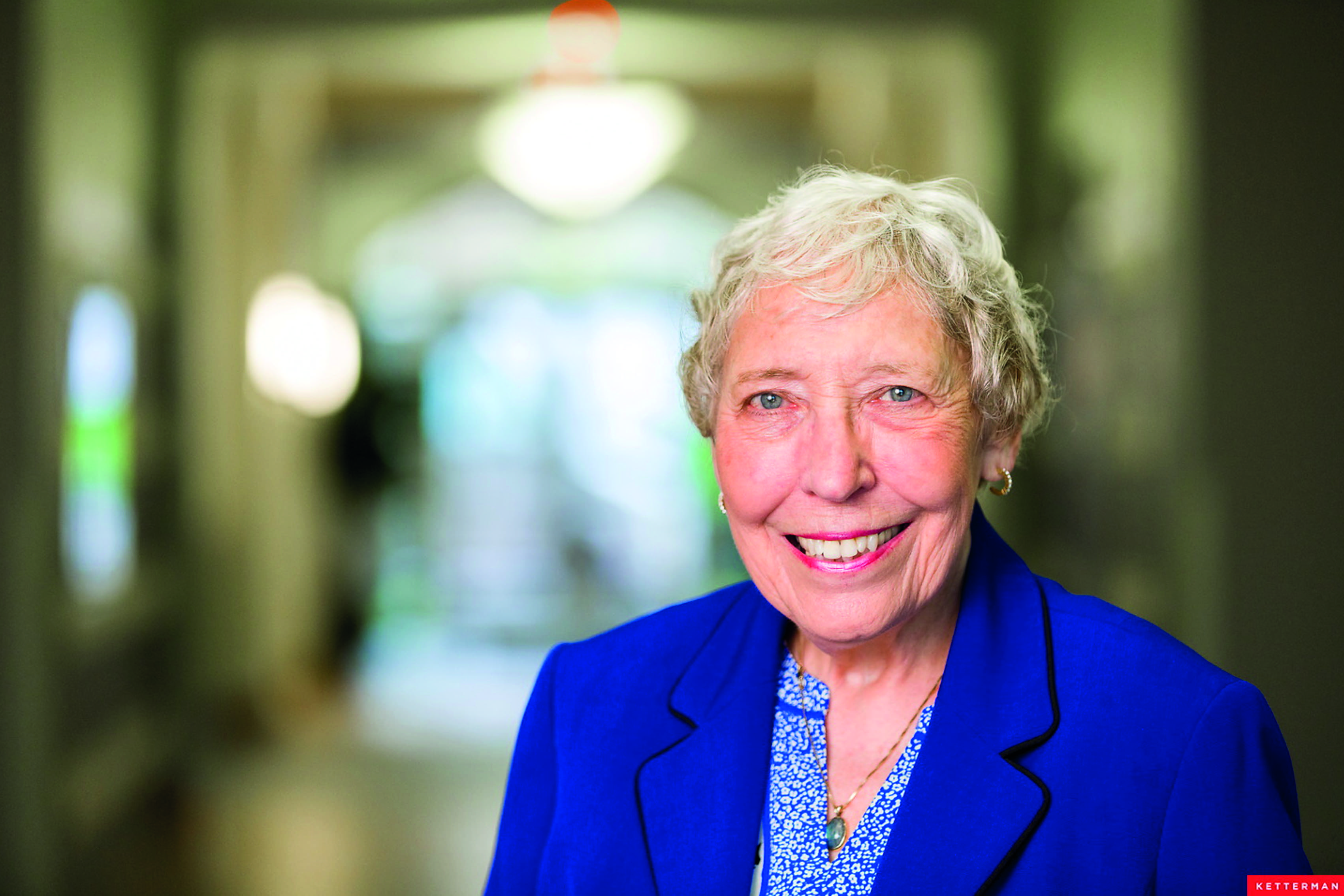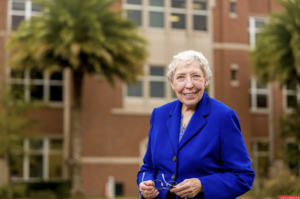
Ruby Parker Puckett FFCSI certainly walks the talk; her resume reads like a novel. Her energy and enthusiasm for all her many activities and undertakings is contagious. She has taught, trained and mentored thousands of dietary managers and other industry professionals.
Having known of and interviewed Puckett over the last decade, I feel honored to capture her life and career in this article, yet terrified. How does one “sum up” a legend?
Early years
Growing up on her grandfather’s farm in Birmingham, Alabama, where her family moved after the depression, Puckett counts her grandfather as one of the most influential people in her life. “He taught me how to ride a horse, how to fish, how to relate to and treat others,” she says, recalling a powerful memory of her grandfather offering corn syrup to friends and neighbors struggling to make ends meet during that time.
At Woodlawn High School in Birmingham (from which she would later earn an Alumni Hall of Fame award), Puckett was drawn to chemistry. But it was later, while studying at Auburn University, that she decided to apply her love of chemistry to home economics and nutrition, as she didn’t want to end up in a lab somewhere.
Puckett went on to complete her internship at Henry Ford Hospital in Michigan and, after serving as a dietitian at other hospitals, she earned her MA in Healthcare Science Education from Central Michigan University. She spent the majority of her career, however, at Shands Hospital – originally an independent hospital that later became part of the University of Florida. There, she served from 1968 until 1992 as the director of food and nutrition services. Puckett’s unofficial “debut” into the realm of consulting, and one of her greatest achievements at Shands, came about in the early 1990s when the hospital petitioned for a total renovation of the existing foodservice program.
“It was to be a $14m project and the consultant wasn’t agreeing with anything anyone said and I spoke up about some of the things I knew we would need for the department,” Puckett says, recalling one of the first project meetings. “Suddenly the administrator stood up and said: ‘Ruby will be the leader of this renovation. What she says she gets’.”
This event cleared Puckett’s path to be experimental and innovative when it came to revamping the servery at the time. She implemented an expansive cook-chill program, added an ice cream shop, high-end pizza station, fast food ‘mall’ and private dining space, all the while making sure that the kitchen and cafeteria would be gorgeous with beautiful designs and artwork. “I didn’t know a lot about plumbing or electricity, but I had to learn fast on that project,” says Puckett, who became the first department director to be appointed as the project manager for the total renovation of any part of the hospital. This was one of Shands’ largest comprehensive projects and earned recognition as a trailblazing endeavor in a variety of industry magazines.
“We worked around the clock and never missed a meal, continuing to serve 5,000 meals a day,” Puckett says. “I was the only woman and the ‘big cheese’ on the project. We all worked together so well.”
It was the pinnacle of Puckett’s work at Shands, and soon after it was time to move on. She left to start her own business in 1995, Foodservice Management Consultants. In this capacity, she worked nationally with major university hospital foodservice departments, developed HACCP programs as well as other educational programs, and continued to publish regularly.
Teaching and education
While at Shands, Puckett taught systems management at the University of Florida, but one of her greatest accomplishments was, and continues to be, her work with the Dietary Managers Training professional certificate program. She founded it in 1972 and it has since expanded to an online program.
The award-winning continuing education program, which has enrolled over 40,000 students internationally, educates foodservice personnel on management systems, nutrition and medical nutrition therapy to become Certified Dietary Managers. Since its inception, Puckett has served as the program director and author of all training materials as well as a mentor to many in their careers.
She has also developed and provided education materials, free of charge, to colleges, universities and dietitians in England, Japan, Hong Kong, Australia, Jordan, Saudi Arabia, the Bahamas and Puerto Rico. Some of her work has even been translated into other languages.
The inspiration for the program stemmed from her experience as a teacher for a foodservice supervisor course offered by the Academy of Nutrition and Dietetics (formerly the American Dietetic Association) in Tennessee where she was working at the time. After moving to Florida, she approached University of Florida Division of Continuing Education to implement the new program.
About five years ago, the program went completely online. “This program has been helpful for those working in institutional foodservice management and especially healthcare, when in the past you might have had a handful of cooks running the kitchen, now there’s someone who knows why we do certain things and not others,” she says. “I think this has led to the improvement of foodservice in many institutions, and especially in nursing home and extended care facilities.”
 And now, 46 years later, Puckett remains involved in the program on an advisory level. “To continue helping people improve their lifestyle,” she says. Lately, there’s been a growing interest in medical nutrition therapy and teaching chefs, dietitians and foodservice directors about the medical benefits of various foods. Publications and disaster relief Puckett’s list of publications is impressive. One of her most notable works is the AHA’s Food Service Manual for Healthcare Institutions (revised by Puckett in 2004 with the fourth edition published in 2013) and co-author of Food Service Management: A Systems Approach to Healthcare and Institutions. She has authored countless other papers, and has published 12 books, six chapters in other text books, and given over 435 presentations to local, state, national and international audiences. Puckett estimates she publishes six to 10 articles each year and remains on the editorial advisory board for a variety of publications.
And now, 46 years later, Puckett remains involved in the program on an advisory level. “To continue helping people improve their lifestyle,” she says. Lately, there’s been a growing interest in medical nutrition therapy and teaching chefs, dietitians and foodservice directors about the medical benefits of various foods. Publications and disaster relief Puckett’s list of publications is impressive. One of her most notable works is the AHA’s Food Service Manual for Healthcare Institutions (revised by Puckett in 2004 with the fourth edition published in 2013) and co-author of Food Service Management: A Systems Approach to Healthcare and Institutions. She has authored countless other papers, and has published 12 books, six chapters in other text books, and given over 435 presentations to local, state, national and international audiences. Puckett estimates she publishes six to 10 articles each year and remains on the editorial advisory board for a variety of publications.
Disaster relief has been an integral part of Puckett’s consulting, teaching and published works. She co-authored Disaster and Emergency Preparedness in Food Service Operations with Char Norton FFCSI, published by the American Dietetic Association in 2003, and has since written articles and papers on the subject.
“As a long-time Floridian, I have been through a number of hurricanes, tornadoes and floods,” says Puckett, who, in addition to publishing works on the subject, working with the Red Cross and other disaster task forces, has expanded her management consultant services to include disaster and emergency planning.
She has even traveled with the military to evaluate foodservice operations and mess halls around the world. Ironically, as we spoke, Hurricane Michael was slamming against the Florida Panhandle. Michael was only one of three category five hurricanes to have made landfall in the Panhandle since 1950 and one of the strongest to hit the US directly in 14 years. Even then, flooding remained a problem in the Carolinas, still reeling from Hurricane Florence a week prior.
“First, you need to have a plan, plus plenty of water,” she says. “Then canned food and an agreement with your vendors to drop off a list of supplies that you come up with ahead of time.” Sounds simple, but this is the stuff that literally saves lives.
Associations
It would take days to talk about Puckett’s involvement in the Academy of Nutrition and Dietetics (AND), but let me throw out just a few of her many achievements with this association: she was instrumental in the inception and growth of the Management in Food and Nutrition System Practice Group, serving as chair three times. She has also served as a committee chair, board member or district board member in a variety of capacities, and even served as a Florida Legislative representative to the ADA.
Most of Puckett’s involvement in FCSI centered, until December 2018 when she “retired,” on the association’s Educational Foundation. She served as president and also took turns serving as treasurer and director. Puckett spent three years on the board of directors for The Americas Division (TAD), authored the revised Code of Ethics, and even served on the task force to develop the TAD magazine.
In 2012, Puckett became the second RD and fourth woman ever to be inducted in FCSI’s prestigious Council of Fellows, the highest honor given by the association. “I remember that day so well,” Puckett says. “I had my speech all written out, but up on the stage my pages got mixed up and tears started to come into my eyes because I had taken so long to write it and remember all the people I wanted to thank. I am still emotional about it; it was a special honor, and so many people had been supportive of me over the years. I remember looking out and one of those people was smiling at me and I just lost it.”
Only one other honor has held a flame to the FFCSI designation; her invitation in 2010, based on her academic achievements, to become part of the Athenaeum Society of the University of Florida. The society was founded in 1905 and had never had a woman member (even though the society is named after a Greek goddess). Since then she has helped recruit four other women.
Charity and family
Throughout her career in education and service, giving back remains an important part of Puckett’s personal mission. She has served as a member of the Gainesville Woman’s Club working on food safety and cardiovascular disease. She and her husband have worked with Altrusa International to help local schools promote reading and raising funds to send underprivileged children to summer camp. She was a speaker/instructor for the Black Senior Citizen Organization and the Catholic Women, where she provided handouts and free counseling. She has raised countless funds for Shands, her old stomping ground. I’m not even halfway through her list of charity activities.
Though her extensive work, writing and activities paint the picture of all we know and respect about Puckett, family remains the most important thing to her. She is married to Larry W. Puckett, her high school sweetheart, with whom she has two daughters, six grandchildren and seven great-grandchildren. “I am so blessed to have a loving husband and family,” says Puckett, who has enjoyed camping, hiking and white-water rafting adventures with her family over the years.
“It’s nice to live many of your dreams and feel like you helped someone along the way, and to have a loving family through it all,” she says. “I’ve had a marvellous life.”
Amelia Levin
Pictures: Ryan Ketterman
